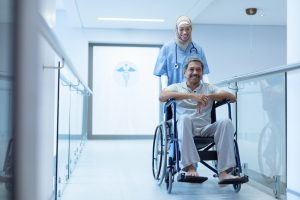During my medical training, I met Mr. J, a patient who had been wheelchair-bound for years following a severe car accident. He was sharp, independent, and well aware of the challenges he faced in health care settings. When I entered the exam room, he greeted me with a knowing smile.
“So, how do you want to do this?” he asked. “Most doctors just do the exam while I’m in my chair.”
I hesitated for a moment before responding. “A full physical exam involves checking areas that may not be easily accessible while you’re seated. For example, assessing your lower back, hips, and reflexes thoroughly is easier when you’re lying down. It also allows me to check for any pressure sores or areas of discomfort that might not be as noticeable in the chair.”
His brow furrowed. “Is that really necessary? No one else has asked me to do that.”
I had learned in class that many patients with disabilities don’t receive comprehensive physical exams because providers are unsure how to safely transfer or position them. Without proper training or accessible equipment, many physicians opt for an incomplete assessment, unintentionally reinforcing a health care system that overlooks their needs.
“I don’t want to assume the best way to help,” I said. “Would you be comfortable talking through options? Maybe a sliding board, or a two-person lift?”
His expression shifted from skepticism to mild surprise. “Most people don’t ask,” he admitted. “They just try to move me, or worse, skip the exam altogether.”
We talked through the logistics. Could he lift himself with some support? Did he experience spasms that might make the transfer more challenging? As we discussed a two-person lift, he eyed me warily.
“No offense, but you’re not exactly built like a linebacker,” he said.
I grinned. “Fair point. Neither is my colleague, but this is about technique, not brute strength. I’ll take your feet, and they’ll wrap their arms around your chest. On the count of three, we’ll lift together.”
He nodded slowly. “Alright. Let’s do it.”

Together, with careful communication and adjustments, we made the transfer safely. Throughout the process, I checked in with him—“How’s that? Need a break?”—ensuring he remained actively involved.
By the time he was settled, I could tell we had built something essential: trust. Later, I reflected on the interaction. Trust isn’t automatic in medicine; it’s earned through respect, collaboration, and time. Studies show that only 40.7% of physicians feel confident in providing the same quality of care to patients with disabilities as they do to able-bodied patients1. The lack of accessible exam rooms, proper equipment, and training contributes to disparities that cannot be solved by policy changes alone. What is needed is a cultural shift, where providers actively listen, learn, and include patients in decisions about their care.
However, another crucial aspect of patient care is recognizing and addressing the assumptions that often surround disability. People, including health care professionals, frequently assume that those with disabilities do not live fulfilling, independent lives. They may assume that a patient with a disability cannot drive, requires a full-time caregiver, or is not sexually active. Questions like “Who drove you here?” or “Do you have someone to help you at home?” while sometimes well-intentioned, can inadvertently reinforce stereotypes rather than respecting the individual’s autonomy.
The reality is that 13% of people in the United States have a disability, and many lead active, self-sufficient lives2. They work, engage in relationships, have families, and participate fully in society. Assuming otherwise not only alienates patients but also diminishes the quality of their care. Physicians must move beyond assumptions and instead ask open-ended questions that allow patients to define their own capabilities and needs.
As I left the room, Mr. J looked at me thoughtfully. “I’m glad you asked,” he said. “I know a lot of people with disabilities, and sometimes doctors just group us all together. But every disability is different.”
His words stayed with me. Professionalism in medicine is not just about knowledge or technical skill—it’s about recognizing that every patient, regardless of ability, deserves thorough, equitable, and compassionate care. By embracing adaptability and lifelong learning, future providers can build a system where trust is not an exception, but the foundation of every patient interaction.
Manal Imran, MS, is a third-year medical student at the Herbert Wertheim College of Medicine. Born and raised in Florida, she was inspired by the state’s vibrant diversity to pursue a career rooted in equity and inclusion, with a particular interest in improving access for patients with physical disabilities. In her free time, she enjoys traveling, spending time in nature, and practicing photography.
References
- Iezzoni, L. I., Rao, S. R., Ressalam, J., Bolcic-Jankovic, D., Agaronnik, N. D., Donelan, K., Lagu, T., & Campbell, E. G. (2021). Physicians’ Perceptions Of People With Disability And Their Health Care. Health affairs (Project Hope), 40(2), 297–306. https://doi.org/10.1377/hlthaff.2020.01452
- Persons with a disability: Labor Force Characteristics – 2023. Bureau of Labor and Statistics. (2023). https://www.bls.gov/news.release/pdf/disabl.pdf

